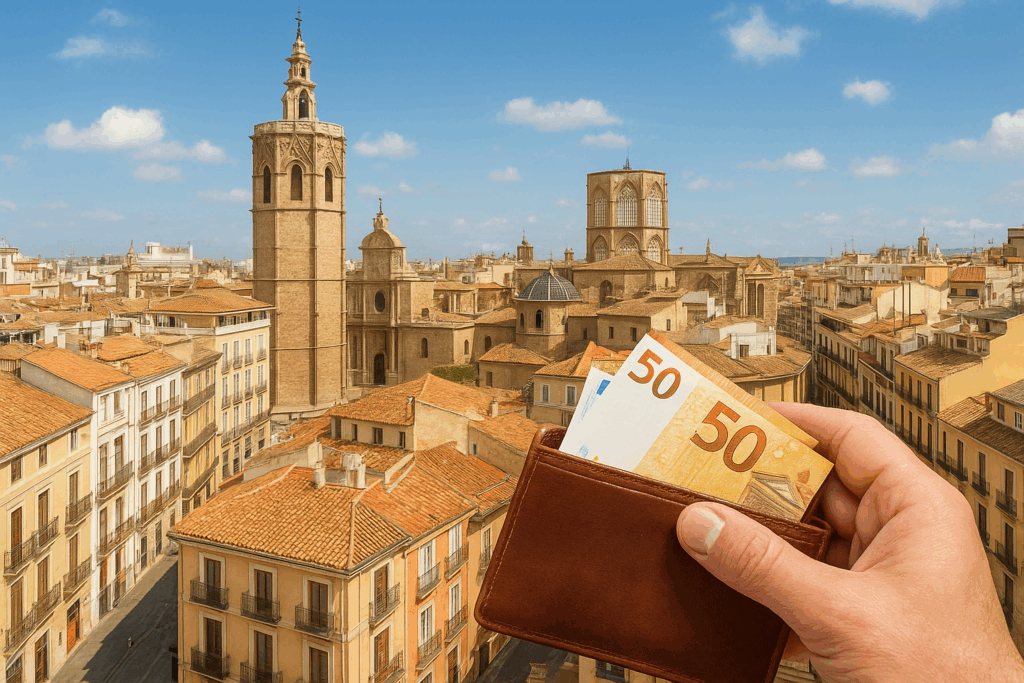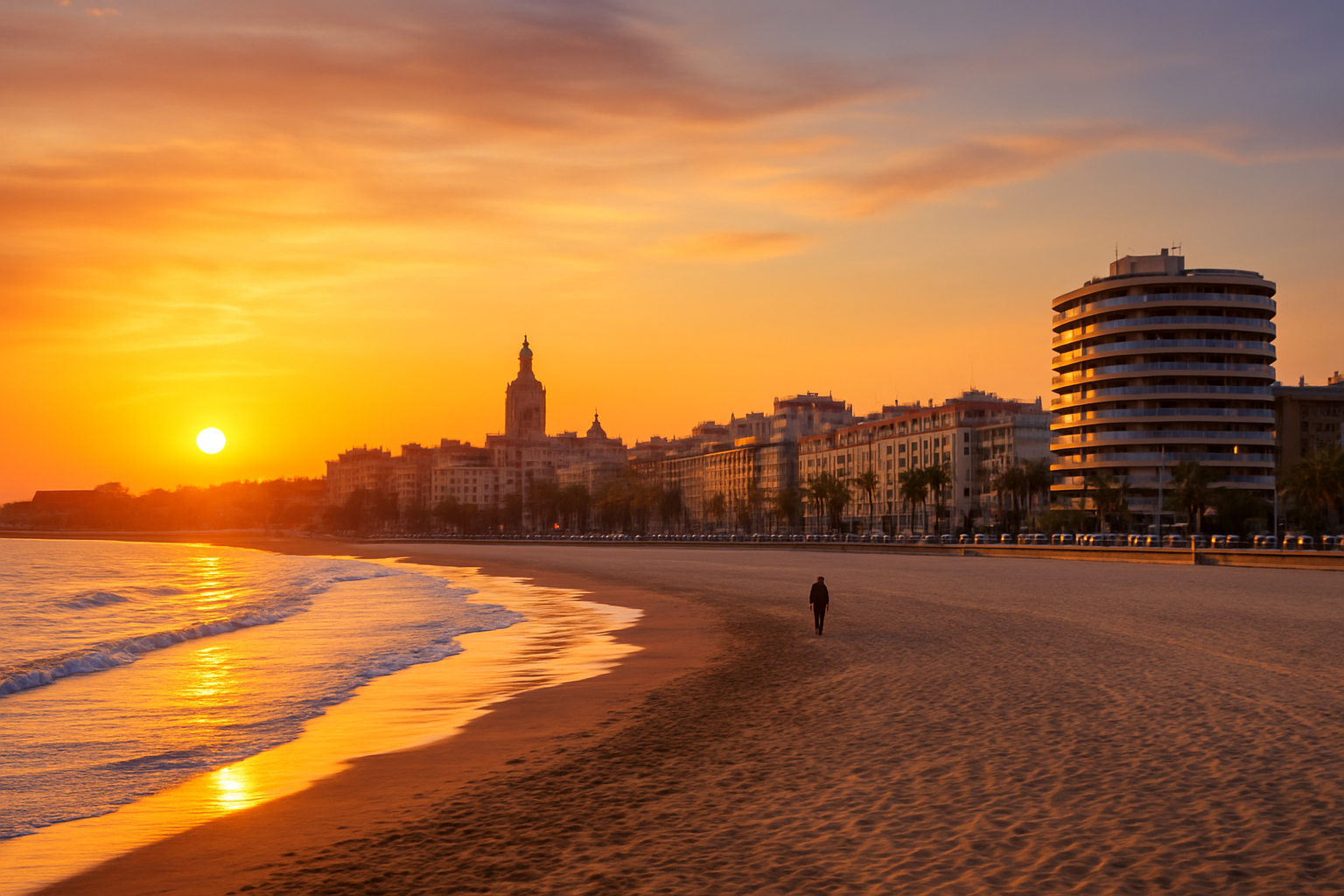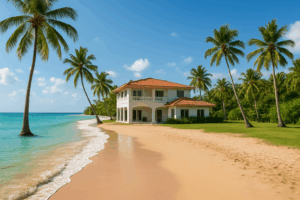What Does Life Really Cost in Valencia? A Deep Dive in 2025
October 11, 2025
Table of contents for the article
ToggleWhat Does Life Really Cost in Valencia? A Deep Dive in 2025
Valencia, Spain — sun-drenched Mediterranean beaches, historic gems, tasty paella, festivals, and a high quality of life with a more affordable cost than Madrid or Barcelona. But how much do you actually need to live here, especially if you are renting or buying real estate?
This article unpacks the cost of living in Valencia in 2025. We’ll look at housing (renting vs buying), utilities, food, transport, taxes, entertainment, and give sample monthly budgets for different lifestyles. If you’re considering moving, relocating, investing, or simply curious, this will give you realistic numbers grounded in current data.
1. Valencia in Context: Why Consider Living Here?
Valencia is Spain’s third biggest metropolitan area and the capital of the Valencian Community. It has a rich history, warm climate, lower cost of living than Spain’s two largest cities, strong public infrastructure, a Mediterranean lifestyle, vibrant food culture, and growing appeal for expats, remote workers, and retirees.
Valencia is becoming one of the most desirable mid-sized European cities: lower housing prices compared to Madrid and Barcelona, good quality of life, access to beaches, cultural offerings, and increasing interest from international buyers and renters. However, with that demand comes rising costs in certain sectors — especially real estate.
2. Housing Costs: Renting in Valencia
2.1 City Centre vs Outskirts
One of the biggest variables in Valencia’s cost of living is rent. As in most cities, location matters a lot. Renting in city centre neighbourhoods (such as Ruzafa, El Carmen, Pla del Remei, Ciutat Vella) is significantly more expensive than in outer districts or suburbs (e.g. Patraix, Benicalap, Jesús, Campanar).
From recent data:
One-bedroom in centre: ≈ €800–€1,300/month depending on neighbourhood and condition.
One-bedroom outside centre: ≈ €600–€900/month.
Two-bedroom apartments central: €1,200–€2,000+ depending on area, amenities, and view.
Three-bedroom in central zones or luxury apartments: €1,500–€2,500+ depending heavily on the location.
Three-bedrooms outside centre: around €1,000–€1,300/month.
2.2 Apartments by Size
| Apartment size | City centre rent (monthly) | Outside centre rent (monthly) |
|---|---|---|
| Studio / 1-bedroom | ~ €800-1,300 | ~ €600-900 |
| 2-bedrooms | ~ €1,200-2,000+ | ~ €900-1,400 |
| 3-bedrooms | ~ €1,400-2,500+ | ~ €1,000-1,500 |
These are averages and ranges; exact cost depends on condition, furnishings, amenities, view, proximity to metro/public transport, etc.
2.3 Rental Trends & Fast-Moving Market
The rental market in Valencia has shown substantial rises in recent years:
Rental prices per square meter have increased by around 76% from 2020 to 2025 in some zones.
Strong demand and limited supply mean good flats in desirable locations often get rented very quickly.
Rental subsidies exist for eligible residents under certain conditions, with caps on maximum monthly rent.
Thus, if you are renting, timing, negotiation, and neighbourhood choice make big differences.
3. Buying Property in Valencia
If renting is one option, many consider buying. Let’s see what it costs to purchase, what fees are involved, and what you should expect.
3.1 Price per Square Meter by Area
The average purchase price per square meter in Valencia city is around €2,800–€3,000/m² for many neighbourhoods.
Luxury or prime areas (Pla del Remei, Gran Vía, Malvarrosa beachfront, etc.): €4,500-€6,000+ / m².
Emerging or less central areas (Patraix, Jesús, Benicalap, etc.): €2,100-€2,600 / m².
Rural or outskirts / smaller towns around Valencia: sometimes €1,500-€2,000 / m² or lower.
3.2 Legal & Transactional Costs
Buying property in Spain includes more than just the price per square meter. You’ll face:
Notary fees
Registration of property title
Property Transfer Tax (Impuesto de Transmisiones Patrimoniales, ITP) or VAT + other taxes for new builds
Lawyer fees (strongly recommended)
Mortgage setup fees if financing
These additional costs can be 5–10% or more on top of the purchase price, depending on region and other factors.
3.3 Mortgage, Taxes & Fees
If you take a mortgage:
Interest rates are subject to Spanish and European market conditions.
Down payments are usually 20–30% for non-residents.
Annual property taxes (IBI), rubbish collection, community fees (if in condominium), and insurance apply.
Taxes, social security, and deductions vary, especially for foreigners.
3.4 Luxury vs Affordable Zones – What You Get
What does €2,500/m² vs €6,000/m² get you?
Affordable or mid-range neighbourhoods: moderate apartments, sometimes needing renovation, fewer amenities, further from the beach or landmark sites.
Luxury zones: modern/renovated or new build, better finishes, balconies/terraces, proximity to sea or high-end services, scenic views.
Often, the premium is not just for space, but for location, aesthetics, and prestige.
4. Utilities, Bills, and Monthly Fixed Costs
Beyond housing, there are other fixed costs. These eat into your budget and vary with usage, seasons, and lifestyle.
| Utility / Service | Estimated Monthly Cost (1BR / small apartment) | For Larger Apartment / Family |
|---|---|---|
| Electricity + Heating + Water + Gas | €100–€160 depending on season | €150–€250 or more |
| Internet (broadband, 60–100 Mbps) | €25–€40/month | similar or slightly more |
| Mobile phone plan | €10–€30 depending on data, provider | — |
| Waste collection / municipal fees | Varies; sometimes included in property tax | — |
| Home insurance, community fees (if applicable) | €30–€100+ depending on building | — |
Air conditioning in summer and heating in winter can noticeably raise electricity costs.
5. Food, Groceries, Dining Out
Food is often where people notice savings compared with many Northern European or North American cities.
Groceries per month for one person: €180–€250 if buying mostly fresh, local food and cooking at home.
Family of four: €400–€600 depending on preferences.
Dining out:
Menu del día (midday set menu): €10–€15.
Dinner for two at a mid-range restaurant: €45–€60.
Coffee in café: €1.50–€2.50.
Markets are excellent for fresh produce, meat, and fish at competitive prices. Imported or specialty items are costlier.
6. Transportation & Mobility
Getting around Valencia is relatively affordable.
| Mode | Approximate Cost |
|---|---|
| Single ticket (bus/metro) | ~ €1.50–€2 |
| Monthly public transport pass | €30–€45 depending on zones |
| Fuel / gas for car | ~ €1.60–€1.70 per liter |
Owning a car adds insurance, parking, maintenance, registration, and toll costs. Many residents prefer walking, biking (Valenbisi), or public transport.
7. Health, Insurance & Schooling
If you are relocating from abroad or are non-EU:
Health insurance might be needed; Spain has excellent public healthcare but many use private or supplementary coverage.
Public schools are free for residents, but international/private schools charge tuition.
Other insurance: home, liability, or special coverage (flood, earthquake) depending on area.
8. Lifestyle & Leisure Costs
Gym membership: €30–€50/month
Cinema ticket: €8–€12
Beer or wine in a bar: €2.50–€4
Many public cultural events and festivals are low-cost or free
Valencia’s climate and beaches make outdoor leisure accessible and inexpensive.
9. Sample Monthly Budgets by Lifestyle
| Type of Lifestyle | Monthly Costs ≈ | What’s Included |
|---|---|---|
| Single person, modest lifestyle, renting 1-bedroom outside centre | ≈ €1,200–€1,500 | rent (€700), utilities (€120), groceries (€200–€250), transport (€35), entertainment (€100–€150), miscellaneous (€100) |
| Single person, comfortable, 1-bedroom in city centre | ≈ €1,600–€2,200 | rent (€1,100–€1,300), utilities (€150), food (€200–€300), transport (€35–€45), leisure/insurance (€150–€250) |
| Couple, 2-bedroom apartment, central outskirts mix | ≈ €2,200–€3,000 | rent (€1,200–€1,800), utilities, groceries for two, transport, entertainment, maybe one car or occasional travel |
| Family of 4, 3-bedroom, more comfortable lifestyle | ≈ €2,800–€4,000+ | rent (€1,500–€2,500+), higher utilities, groceries, schooling (if private), insurance, transport, vacations |
10. Realistic Salary Expectations & Income vs Costs
For a single person, a net salary of €1,800–€2,500/month allows moderate comfort in central areas.
A family with children will need around €3,000–€4,500/month net or more for a comfortable lifestyle.
Local salaries are lower than in Northern Europe, though the cost of living advantage helps. Rising housing costs are the main challenge.
11. Tips to Reduce Cost of Living in Valencia
Choose a neighbourhood slightly outside the centre for more space and lower rent.
Negotiate rent where possible.
Consider shared accommodation for singles.
Buy resale properties to save on purchase costs.
Use energy-efficient appliances to cut utility bills.
Eat local and seasonal produce.
Use public transport or bike instead of owning a car.
Skip luxury extras unless they add real value to your lifestyle.
12. Is Valencia Still Affordable in 2025 & Beyond? Outlook & Forecasts
Valencia remains among Europe’s more liveable yet relatively affordable large cities — but affordability is eroding, especially in real estate.
Demand is rising among expatriates, remote workers, and retirees.
Supply is not keeping up, pushing rents upward.
Inflation, interest rates, and construction costs are increasing property prices.
Compared to Madrid or Barcelona, Valencia still offers better value, though future affordability depends on housing supply and policy.
13. Summary: How Much Does Life Really Cost in Valencia?
Modest single lifestyle: ~ €1,200–€1,500/month outside centre
Comfortable single/couple: ~ €1,600–€2,500/month in centre
Family of four: ~ €2,800–€4,500+/month depending on lifestyle
Real estate is the biggest expense. Utilities, food, and transport are manageable, and lifestyle choices make a major difference in total cost.
Conclusion: The True Value of Life in Valencia
Valencia — a city that captures the heart
A unique rhythm of life
Valencia is one of those rare cities that captures your heart quietly. It doesn’t need to shout like Barcelona or seduce like Madrid — it simply invites you to live well. A morning in Valencia may begin with a slow walk through El Carmen, a historic quarter where narrow cobblestone streets, medieval buildings, and vibrant street art coexist with modern cafes. Street performers, small artisan shops, and colorful murals make every turn a discovery.
The Plaza de la Virgen is a prime example of Valencia’s unique charm: Gothic architecture, Roman ruins, fountains, and the sound of street musicians create an atmosphere where the past and present seamlessly coexist. In the evening, a stroll along the Malvarrosa or Las Arenas promenade allows residents and visitors to enjoy the Mediterranean sunset, a soft sea breeze, and the faint scent of salt in the air.
Valencia’s futuristic landmarks, such as the City of Arts and Sciences and Palau de les Arts Reina Sofia, stand in dramatic contrast to historic neighborhoods. These architectural marvels house theaters, science museums, planetariums, and concert halls, creating a sense of living in a city that bridges past, present, and future.
The value of money and time
Living in Valencia is far more affordable than in larger European cities. Rent for a one-bedroom apartment in the city center, for example in Ruzafa, averages €1,000–€1,200 per month. In quieter neighborhoods like Benimaclet, Campanar, or La Xerea, spacious apartments are available for €700–€800 per month.
Yet money is only one part of the story. Valencia gives residents time, hours that in megacities are spent in traffic can here be dedicated to oneself, friends, or leisure activities. Jardines del Turia, a nine-kilometer park created from a former riverbed, is perfect for cycling, jogging, morning yoga, or simply enjoying a book on a sunny bench surrounded by lush greenery.
A morning can begin with a coffee and pastry at Dulce de Leche Boutique, followed by a visit to Mercado Central, where fresh oranges, seafood, local cheeses, and artisanal bread are available at reasonable prices. On weekends, many families enjoy picnics under the orange trees or attend outdoor concerts in Plaza del Ayuntamiento, soaking in Valencia’s vibrant community life.
A city of human scale
Comfort and charm
Valencia combines the infrastructure of a large city with the comfort of a medium-sized one. Excellent hospitals, reliable public transportation, international schools, and an active expat community make life convenient, while the city’s compact layout ensures most destinations are reachable by bike or even on foot within 15–20 minutes.
Local cafes, such as Café ArtySana, La Más Bonita, and Federal Café, provide the perfect environment for relaxed mornings or casual meetings. Ruzafa Market and Mercado de Colón allow residents to purchase fresh produce affordably, while street stalls on Plaza del Mercado offer seasonal fruits, seafood, and local cheeses.
Expenses and everyday life
A single person can live comfortably on €1,600–€2,000 per month. This covers rent, food, entertainment, and leisure activities.
Dining at seaside restaurants such as Casa Roberto or La Pepica costs €20–€25 per person, while a coffee and croissant costs around €2.50, a cinema ticket €8, and a gym membership €40. A monthly unlimited public transport pass costs about €45.
Leisure activities are abundant: cycling along Jardines del Turia, walking on Malvarrosa, Las Arenas, or Patacona beaches, visiting open-air markets, or spending an evening on a terrace with friends — all contribute to a fulfilling lifestyle without stress or hurry.
The art of balance
Tradition and modernity
Valencia’s greatest strength lies in balance. The city blends tradition with modernity, accessibility with quality, dynamism with serenity.
World-class festivals, such as Las Fallas, transform the city into a theatrical stage: enormous papier-mâché figures, fireworks, and street performances attract thousands of visitors, creating a vibrant and joyful atmosphere. Locals participate alongside tourists, turning the festival into a communal celebration.
Other cultural events, like the Feria de Julio and Corpus Christi, showcase Valencia’s deep-rooted traditions through parades, music, theatrical performances, and culinary experiences. Visitors can taste paella, the region’s most famous dish, or enjoy horchata, a refreshing drink made from tiger nuts, while learning about local customs.
Art lovers are drawn to galleries like IVAM, Bombas Gens, and the Museum of Fine Arts, which exhibit contemporary and classical art alike. Meanwhile, local markets like Ruzafa Market remain lively spaces where neighbors discuss news, purchase fresh produce, and socialize — a perfect example of community life.
Real estate and investments
The real estate market remains relatively affordable compared to other Mediterranean cities. Increasingly, foreigners, retirees, and remote workers choose Valencia not just as a place to live, but as a place to belong. Security, a sense of home, and community take precedence over mere square footage.
Central apartments cost €1,000–€1,200, while those in residential areas range from €700–€900. Property purchases offer good investment opportunities due to the city’s growing popularity, while long-term rental prices remain stable and predictable.
An international hub with prospects
Startups, freelancers, and creative professionals
Valencia has become a hotspot for startups, freelancers, and creative professionals. Coworking spaces such as Wayco Ruzafa, Vortex Coworking, and The Nest provide spaces for work, collaboration, and networking. Tech meetups, cultural workshops, and startup conferences foster creativity and professional growth while maintaining work-life balance.
Education and healthcare
International schools, including American School of Valencia, Caxton College, and Cambridge House, cater to expatriate families. English is widely used in business and education, making integration easier for newcomers.
Healthcare in Valencia is among the best in Spain, with accessible public and private options. Private insurance remains affordable, and pharmacies and clinics operate efficiently, ensuring convenient access to medical care.
For families, retirees, and remote workers, Valencia offers a rare combination of safety, sunshine, stability, and affordable living costs.
Simple pleasures that enrich life
Life in Valencia is full of small pleasures. Morning walks in Jardines del Turia, fresh seafood at Mercado Central, coffee at Dulce de Leche Boutique, evening concerts at Plaza del Ayuntamiento, and beach sunsets at Malvarrosa or Las Arenas create a sense of richness in daily life.
With over 300 sunny days per year, residents naturally spend more time outdoors: cycling, walking, participating in festivals, attending open-air concerts, or enjoying beach activities. Even without extravagant spending, the city offers abundant opportunities for joy and relaxation.
Challenges behind the charm
Valencia’s popularity has led to rising rental prices, especially in Ruzafa and El Carmen. Some locals struggle to find housing, and short-term rentals can cause disputes. Bureaucracy, although improving, may frustrate newcomers.
Nevertheless, the balance of cost and quality remains remarkable. Safety, infrastructure, and predictable expenses make daily life easier than in most European capitals.
The true price of happiness
Happiness in Valencia is measured in moments, not money. It is in sunlight flooding an apartment on Plaza de la Virgen, the scent of fresh bread from Horno San Bartolomé, children laughing in public squares, evening chats with friends, or spontaneous walks through Ruzafa, El Carmen, or Benimaclet.
Valencia teaches its residents to appreciate simple joys: slow mornings, leisurely lunches, community gatherings, and cultural immersion. True happiness lies in these everyday moments.
A future under the sun
Valencia is developing rapidly while preserving its authenticity. Former industrial areas are being transformed into creative hubs, green projects are making the city more sustainable, and cultural initiatives continue to thrive. The balance between progress and the preservation of the city’s soul ensures Valencia remains vibrant and desirable for decades.
Mediterranean state of mind
Living in Valencia redefines the meaning of luxury. Here, luxury is time, light, air, and connection. A morning breeze from the sea, a stroll on the beach, an evening on a terrace with friends — these simple pleasures make life richer than in most major capitals.
Valencia rewards curiosity, inspires creativity, and fosters a sense of home — regardless of age or background. The cost of life here is measured not in euros, but in moments — and these moments are priceless.






